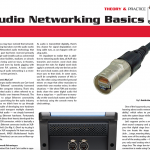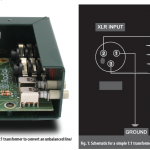In the June and July 2013 issues of FOH, Steve LaCerra presented a two-part mini-series on the art and science of being both FOH mixer and tour manager. After an overwhelmingly positive response from readers, we asked him to add some more tips on the topic, so here we have the latest installment in our series on the adventures in tour managing. —ed.
As the old saying goes, sometimes you’re the windshield… and sometimes you’re the bug. In other words, sometimes you’re the headliner and sometimes you’re support. Regardless of which, please play nicely in the sandbox. It’s an unfortunate fact of life that when you’re a support act, you’re often at the mercy of the headliner.
Here’s an example. Names have been removed to protect the guilty. We show up for a one-off gig at a major venue in Florida, opening for a major arena rock act. Our load-in is 2:00 p.m., but my crew and I arrive early to sniff out the staging and the rental backline (we stay out of the way). Doors are at 6:30 p.m. It’s a sold-out house of approximately 15,000. The headliner has not yet sound checked, so we sit tight (and silent).
Three p.m.: no lead singer, no sound check for the headliner. Four p.m., ditto, and we’re still in a holding pattern. Five p.m.: Mr. Headlining Lead Singer has finally shown up. How kind of him. He stands on the stage and bullsh*ts with his entourage until 5:30 (they don’t sound check). At 6:00 p.m., we are given access to the stage. Why, thank you so very much. A whole 30 minutes to set the stage, line check (at this point a sound check is out of the question) and be off the stage so the venue can open doors.
When the show starts, I find that our illustrious hosts have shut down about two-thirds of the P.A. system, just in case it was not absolutely clear who is the windshield and who is the bug. Really? I though crap like that went out with high school. I’m sure that Obnoxious Headliner’s Production Manager would love to have seen me completely blow a gasket and start yelling and screaming at front of house (which is what I really wanted to do). Sorry, but I’m not going to fuel your fire, jerk.
We would never do that to a support act. We’re pretty adamant about the schedule: get on when you’re supposed to and, more importantly, get off the stage when you are supposed to. We do our best to set up and sound check while still leaving time for the support act to do the same. That’s where a good stage manager earns his cash for the day: making sure that the clock is adhered to as closely as possible. There aren’t many things that tick off me and my guys, but starting late is at the top of the list. If you’re a support act and you start late, that’s not my problem, but please end on time. You may be unaware of the fact that we are dealing with a hard curfew, whereby neighbors will get pissed if the show runs past a certain hour or (worse) there is a fine for going past a certain hour. The best support acts start and end on time. How do they sound? I really don’t care.
There may be days when you can’t get to a gig until 4 p.m. due to travel. Late arrivals make for stressful days. Keep in mind that other acts’ crews have work to do and they can’t always wait for you. We have been lucky to work with many backline companies who ask for our stage plot and rough our backline into place before we arrive on-site, giving us a head start. That’s a major timesaver. Here’s a major time-waster: stagehands who place mics on a rental drum kit before the band’s drum tech arrives. Even when a rental company’s backline tech is great, he (or she) is not going to set the kit the way the drummer’s tech can (and even that’s no guarantee that the drummer will be happy!). Inevitably the drums and cymbals must be rearranged. As a result, the microphones and stands come down, cables become tangled, the drum tech moves everything around and then the mics go back up. So if you are on the other side of that equation, set the mics on stands in front of the kit but don’t place them before the kit is settled.
Not-So-Deep Thoughts
• Think ahead so you can save money for your band. One 9-volt battery at a convenience store on a Sunday night? Seven bucks. One 9-volt ProCell when purchased in bulk: $1.70. That’s a big difference. Ditto for guitar and bass strings, drumsticks and heads, Sharpies and gaff tape.
• Make sure that the dressing room is close to the stage. I learned this the hard way at outdoor shows where there’s no real “venue” (like a street fair). On one occasion, the stage was so far from the dressing room that every time we wanted to go back and forth someone had to drive us. It was a pain in the arse because — in the absence of a bus — the dressing room is our home base. I think my crew and I made about 371 trips between the stage and dressing room each day, so walking distance is a must. Silly? Maybe… until you get to the gig and realize it’s an issue.
• Carry native currency when traveling to a foreign country. Even in these times when everyone has a credit card, having a bit of cash to tip a driver or bellman is always a good thing. Oh, and this applies equally in the USA as well.
• Expect the unexpected. We traveled to Trinidad a few years ago, and when we arrived at the airport, we had to pass through immigration. The promoter had a representative meet us and he informed me that there was an entrance fee (which is not uncommon). We were a party of seven. The rep took us over to a desk where an officer told us the fee was $400 USD (I’m not exactly sure how 400 divides by seven evenly, but okay). I give the officer $400 USD cash, he says “thank you” and stuffs the bills in his pocket. Nice. I don’t recall if we got a receipt…
• Safety comes first. Use your brains when dealing with threatening weather. We’ve done or had shows where the promoter held their breath until the last minute before making a decision on whether a show was going to happen under a threat of bad weather. There was also at least one show where the promoter never made a decision, so we did. That’s a stressful situation for everyone involved. No one wants to do all that work to prepare for a show and then cancel it — but waiting until the last minute is not a smart idea.
An early decision makes sense not only because it’s safer, but also because it invites discussion for alternatives. We played a rock cruise last January with (literally) tons of bands performing on various stages on the ship over a period of four days. One of our shows was scheduled to take place outside on the main deck at midnight. There was a possibility of rain (and indeed it did drizzle a bit) but there were also fairly high winds. Sometime around 9:30 p.m., the stage manager and I met and he decided that it would be safer for us to cancel the show. We were disappointed, but it was a wise decision, especially considering the fact that cymbal stands were turning into projectiles. Because the stage manager made the call relatively early, we were able to find a meeting room that wasn’t being used, and we set up an “unplugged” show. They brought a minimal P.A. into the room with a few wedges. I mixed monitors from front of house (ugh!) just like the old club days. The audience loved it, the band and my crew had a great time and I feel like we all worked together to common goal: We pulled it off. And that’s the bottom line.



